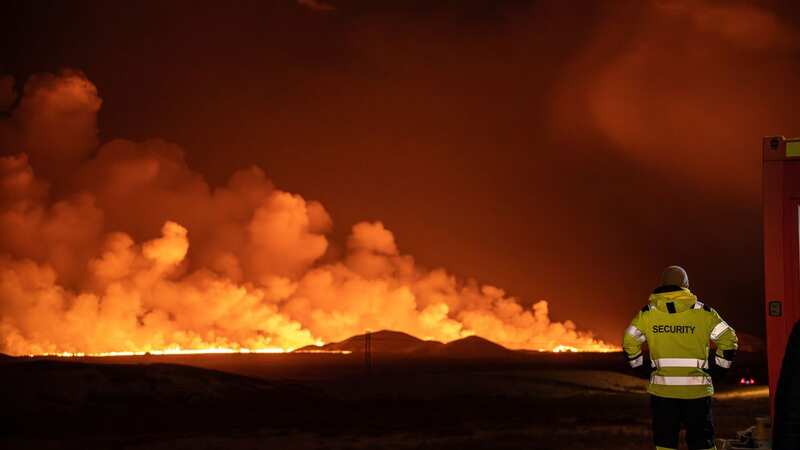Iceland volcano erupts causing travel chaos but there's hope for Christmas
Flights have been severely delayed after a large volcano finally erupted weeks after first threatening to blow.
Passengers have endured lengthy waits at Keflavik Airport in Iceland, a major North Atlantic aviation hub that sits about ten miles to the north east of the town Grindavik in the Southern Peninsula region, which has been evacuated for weeks with an eruption of the nearby Fagradalsfjall seeming imminent.
Airline Play has already had to delay flights due to depart today, with some scheduled to leave more than six hours late. An easyJet flight to Manchester took off at 1.35am, over five hours late, and arrived safely at Manchester airport at 4am.
Passengers were told by easyJet: “We’re sorry that your flight has been delayed. This is because volcanic activity in Keflavik (KEF) is causing restrictions to the areas in which aircraft are permitted to fly. The safety of you and our crew is our highest priority and we thank you for your patience.”
A number of Icelandair flights were held back by several hours this morning but have now taken off. Two of the airlines services from the US due to arrive in Keflavic today have been cancelled.
 Drunk easyJet passenger groped female flight attendant and tried to trip another
Drunk easyJet passenger groped female flight attendant and tried to trip another
It seems that the disruption may be limited and short-lived however. The airport's departure boards show that most flights later this morning and afternoon are due to take off at the right time or with a small delay.
The eruption comes at a bad time, from the passenger's perspective. Unionized air traffic controllers at Keflavik plan to strike from 4am to 10am on December 20 over stalled salary negotiations. This is the fourth work stoppage in the last two weeks, with the previous three resulting in widespread cancellations and disruptions, Crisis 24 reports.
Iceland, which sits above a volcanic hotspot in the North Atlantic, averages an eruption every four to five years. The most disruptive in recent times was the 2010 eruption of the Eyjafjallajokull volcano, which spewed huge clouds of ash into the atmosphere and led to widespread airspace closures over Europe.
Experts had previously said that this eruption would not be as disruptive as the one 13 years ago as Fagradalsfjall was not covered with ice as Eyjafjallajokull was, meaning the blast was cooled, turning the dust cloud into tiny fragments that posed a threat to aircraft. Lava from Fagradalsfjall is much more likely to remain on the ground as it currently is.
Nicola Maxey BSc (Hons), a spokesperson for the UK Met Office said: "An effusive eruption started a few km NE of Grindavík nearby Hagafell just after 10pm last night. This eruption is an effusive eruption, i.e. mainly lava and gas, and that there is no volcanic ash. At this time there is no impact on aviation. Vigorous lava fountains are clearly visible from cameras and radar images, while they reach around 500m in height they do not contain any ash.”
The volcano erupted in southwestern Iceland last night, sending a flash of light into the evening sky and spewing semi-molten rock into the air. Last night Iceland's Foreign Minister Bjarne Benediktsson said on X, formerly Twitter, that there were no disruptions of flights to and from Iceland and international flight corridors remain open. However, this morning there have been some delays.
The November evacuation of Grindavik meant few people were near the site of eruption when it occurred and authorities have warned others to stay away. The nearby Blue Lagoon geothermal spa - one of Iceland's biggest tourist attractions - also closed temporarily that month as a swarm of earthquakes put the island nation on alert for a possible volcanic eruption.
The residents of the evacuated fishing community of 3,400 had mixed emotions as they watched the orange flames touch the dark skies. One month after the evacuation, many are still living in temporary accommodation and don't expect to ever be able to return to live in their homes.
"The town involved might end up under the lava," said Ael Kermarec, a French tour guide living in Iceland. "It's amazing to see but, there's kind of a bittersweet feeling at the moment."
Magnus Tumi Gudmundsson, a scientist who flew over the site on Tuesday morning onboard a coast guard research flight, told RUV that he estimates twice as much lava had already spewed than the entire monthlong eruption on the peninsula this summer.
 EasyJet lets blind boy achieve dream of making boarding announcement at airport
EasyJet lets blind boy achieve dream of making boarding announcement at airport
Gudmundsson said the eruption was expected to continue decreasing in intensity but that scientists have no idea how long it could last. "It can be over in a week, or it could take quite a bit longer," he said.
The Mirror has contacted the airlines due to fly into or out of Iceland today for comment. A spokesperson for British Airways said: "Our flights are operating as planned and we continue to monitor the situation closely."
Read more similar news:
Comments:
comments powered by Disqus


































